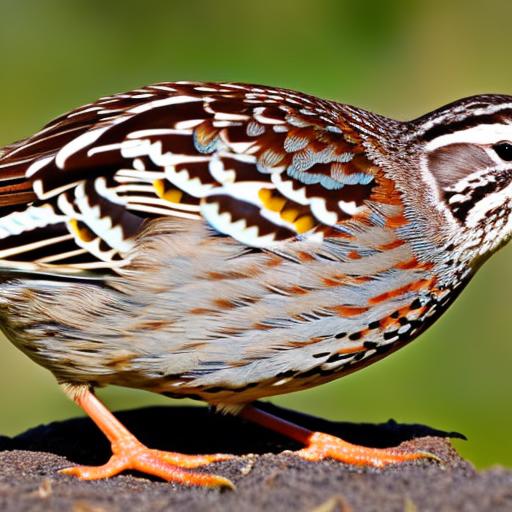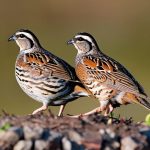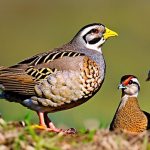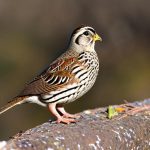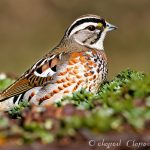Quails are small, ground-dwelling birds that are known for their social behavior and tendency to form large coveys. They are primarily active during the day and are often found foraging for food in open areas such as grasslands, agricultural fields, and gardens. Quails are omnivorous birds, feeding on a variety of seeds, grains, insects, and small invertebrates. They are also known to be attracted to areas with dense vegetation and cover, as it provides them with protection from predators.
Quails are also known for their strong nesting instincts and will often return to the same nesting sites year after year. They are ground nesters, preferring to build their nests in hidden, grassy areas. Additionally, quails are known for their distinctive call, which is often used to communicate with other members of their covey. Understanding these behaviors is crucial when it comes to implementing effective strategies for deterring quails from your garden.
Quails are social birds that prefer open areas with dense vegetation for cover. They are omnivorous and have strong nesting instincts. Understanding these behaviors is essential for effectively deterring quails from your garden.
Key Takeaways
- Quail are ground-dwelling birds that are attracted to gardens with dense vegetation and open spaces.
- Physical barriers such as fences, netting, and covers can effectively deter quail from entering gardens.
- Natural repellents like garlic, chili pepper, and predator urine can be used to discourage quail from foraging in gardens.
- Scare tactics such as motion-activated sprinklers, noise-making devices, and decoys can startle and drive away quail.
- Providing alternative food sources like bird feeders and designated feeding areas can divert quail from garden plants.
- Maintaining a tidy garden by removing fallen fruits, seeds, and dense vegetation can make the area less attractive to quail.
- Seeking professional help from wildlife control experts can provide long-term solutions for managing quail presence in gardens.
Creating Physical Barriers
One effective way to deter quails from your garden is by creating physical barriers that prevent them from accessing the area. This can be achieved by installing fencing around the perimeter of your garden or using netting to cover vulnerable plants. When choosing fencing or netting, it’s important to select materials that are sturdy and tall enough to prevent quails from flying or hopping over them. Additionally, it’s crucial to ensure that the barriers are securely anchored to the ground to prevent quails from burrowing underneath them.
Another option for creating physical barriers is to use raised garden beds or containers to elevate vulnerable plants out of the reach of quails. This not only protects your plants from quail damage but also provides a convenient way to organize and maintain your garden. By creating physical barriers, you can effectively deter quails from accessing your garden and protect your plants from potential damage.
Creating physical barriers such as fencing, netting, or raised garden beds can effectively deter quails from accessing your garden. It’s important to choose sturdy materials and ensure that the barriers are securely anchored to the ground.
Using Natural Repellents
Natural repellents can be an effective way to deter quails from your garden without causing harm to the birds or the environment. There are several natural substances that quails find unappealing and will avoid, such as garlic, chili peppers, and vinegar. These can be used to create homemade repellent sprays that can be applied to vulnerable plants or around the perimeter of your garden.
Another natural repellent that can be effective against quails is predator urine. The scent of predator urine, such as that of foxes or coyotes, can create a sense of danger for quails and deter them from entering your garden. Predator urine can be purchased in liquid form and applied around the perimeter of your garden to create a natural barrier against quails.
Additionally, planting certain herbs and flowers, such as lavender, rosemary, and marigolds, can also act as natural repellents for quails. These plants emit strong scents that quails find unappealing and will avoid. By using natural repellents, you can effectively deter quails from your garden while maintaining a safe and eco-friendly environment for both the birds and your plants.
Natural repellents such as garlic, chili peppers, vinegar, predator urine, and certain herbs and flowers can effectively deter quails from your garden without causing harm to the birds or the environment.
Implementing Scare Tactics
Implementing scare tactics can be an effective way to deter quails from your garden by creating a sense of danger or discomfort for the birds. One common scare tactic is the use of visual deterrents such as scarecrows, reflective tape, or shiny objects like aluminum foil or CDs. These visual deterrents create movement and reflection that can startle quails and discourage them from entering your garden.
Another effective scare tactic is the use of sound deterrents such as wind chimes, bells, or motion-activated devices that emit loud noises. These sound deterrents create a sense of unpredictability and danger for quails, making them less likely to stay in or return to your garden.
Additionally, introducing natural predators such as cats or dogs into your garden can also act as a scare tactic for quails. The presence of these predators creates a sense of danger for the birds and can deter them from entering your garden altogether. By implementing scare tactics, you can effectively create a sense of danger or discomfort for quails and discourage them from accessing your garden.
Scare tactics such as visual deterrents, sound deterrents, and the presence of natural predators can effectively create a sense of danger or discomfort for quails and discourage them from entering your garden.
Providing Alternative Food Sources
One effective way to deter quails from your garden is by providing alternative food sources that will attract them away from your plants. This can be achieved by setting up bird feeders or food stations in a different area of your property where quails are more likely to gather. By providing a consistent source of food in this designated area, you can encourage quails to feed there instead of in your garden.
Another option is to plant cover crops or wild grasses in a designated area of your property to provide a natural food source for quails. These plants not only provide food for the birds but also create a habitat that is more suitable for their foraging behavior. By providing alternative food sources, you can effectively attract quails away from your garden and reduce the likelihood of them causing damage to your plants.
Additionally, ensuring that any spilled birdseed or pet food is promptly cleaned up can help prevent attracting quails to your garden. By providing alternative food sources and managing potential attractants, you can effectively deter quails from accessing your garden and protect your plants from potential damage.
Providing alternative food sources such as bird feeders, cover crops, wild grasses, and managing potential attractants can effectively attract quails away from your garden and reduce the likelihood of them causing damage to your plants.
Maintaining a Tidy Garden
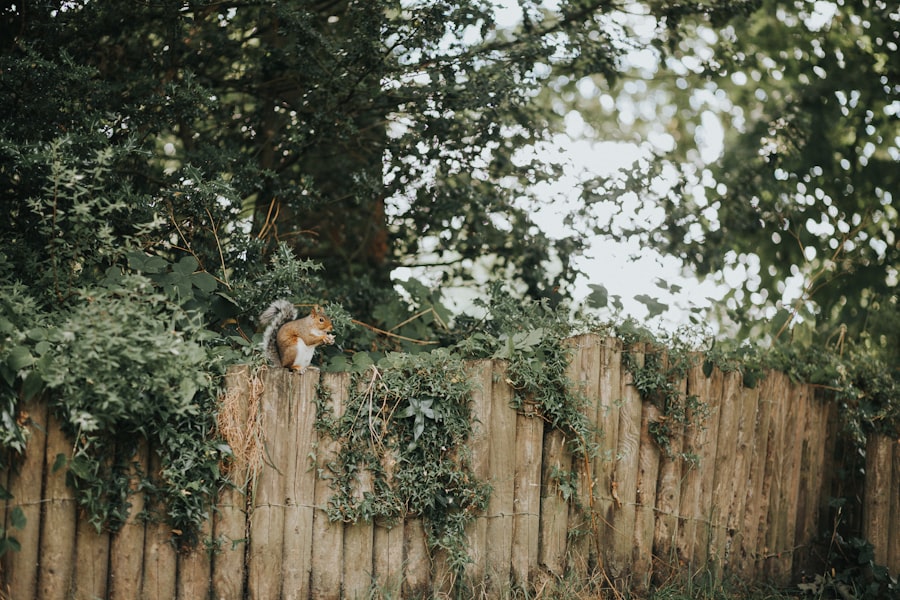
Maintaining a tidy garden is essential for deterring quails from accessing your property and protecting your plants from potential damage. This includes regularly removing fallen fruits, seeds, and other food sources that may attract quails to your garden. Additionally, keeping your lawn mowed and free of tall grasses and weeds can reduce the availability of cover for quails and make it less appealing for them to forage in your garden.
It’s also important to keep your garden free of clutter and debris that may provide hiding spots for quails. This includes removing piles of brush, woodpiles, or other potential nesting sites that may attract quails to your property. By maintaining a tidy garden, you can effectively reduce the availability of food and cover for quails and discourage them from accessing your property.
Furthermore, regularly inspecting and repairing any potential entry points such as gaps in fencing or netting can help prevent quails from accessing your garden. By maintaining a tidy garden and addressing potential entry points, you can effectively deter quails from accessing your property and protect your plants from potential damage.
Maintaining a tidy garden by removing fallen fruits, seeds, keeping the lawn mowed, free of clutter and debris, and addressing potential entry points can effectively reduce the availability of food and cover for quails and discourage them from accessing your property.
Seeking Professional Help
If you have tried various methods to deter quails from your garden without success, it may be time to seek professional help. Pest control professionals have the knowledge and experience to assess the situation and recommend effective strategies for deterring quails from your property. They can provide expert advice on implementing physical barriers, natural repellents, scare tactics, and other deterrent methods tailored to your specific needs.
Additionally, pest control professionals can also provide ongoing monitoring and maintenance services to ensure that the deterrent methods are effective in keeping quails away from your garden. By seeking professional help, you can gain access to expert knowledge and resources that can help effectively address the issue of quail damage in your garden.
In conclusion, understanding quail behavior is essential for implementing effective strategies to deter them from accessing your garden. Creating physical barriers, using natural repellents, implementing scare tactics, providing alternative food sources, maintaining a tidy garden, and seeking professional help are all effective methods for deterring quails and protecting your plants from potential damage. By combining these strategies and tailoring them to your specific needs, you can effectively create a safe and bird-friendly environment in your garden while minimizing the impact of quail damage on your plants.
If you’re looking for tips on how to keep quail out of your garden, you might also be interested in learning about caring for goslings. Check out this informative article on how to care for goslings to ensure the well-being of your young geese. Understanding the needs of different poultry can help you create a harmonious environment for all your feathered friends.
FAQs
What are some effective methods for keeping quail out of the garden?
Some effective methods for keeping quail out of the garden include using physical barriers such as fences or netting, using scare tactics such as motion-activated devices or reflective materials, and planting deterrent plants that quail dislike.
What types of physical barriers can be used to keep quail out of the garden?
Physical barriers such as fences, netting, or chicken wire can be used to keep quail out of the garden. These barriers should be at least 2-3 feet high and buried a few inches into the ground to prevent quail from digging underneath.
What are some scare tactics that can be used to deter quail from the garden?
Scare tactics such as motion-activated sprinklers, noise-making devices, or reflective materials like aluminum foil strips or old CDs can be used to deter quail from the garden. These tactics startle the quail and make them less likely to return to the area.
Are there any plants that can be used to deter quail from the garden?
Plants with strong scents or prickly textures, such as lavender, rosemary, or thorny bushes, can be used to deter quail from the garden. Quail are less likely to forage in areas with these types of plants.
Are there any repellents that can be used to keep quail out of the garden?
There are commercial repellents available that can be used to keep quail out of the garden. These repellents are typically made with natural ingredients and emit scents that quail find unpleasant.
Meet Walter, the feathered-friend fanatic of Florida! Nestled in the sunshine state, Walter struts through life with his feathered companions, clucking his way to happiness. With a coop that’s fancier than a five-star hotel, he’s the Don Juan of the chicken world. When he’s not teaching his hens to do the cha-cha, you’ll find him in a heated debate with his prized rooster, Sir Clucks-a-Lot. Walter’s poultry passion is no yolk; he’s the sunny-side-up guy you never knew you needed in your flock of friends!

